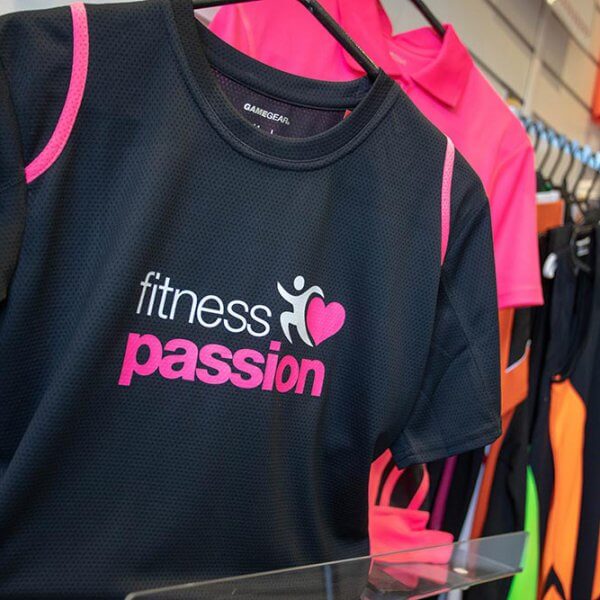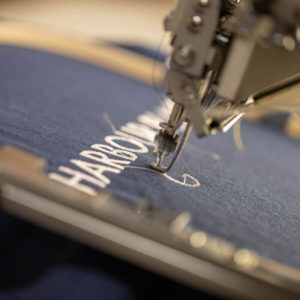ALL ENQUIRIES: 0800 086 2840
ALL ENQUIRIES: 0800 086 2840



Are you in the process of ordering workwear for your staff? If so, one of the questions you might face is whether to choose printing or embroidery to personalise the clothing. Whilst these processes are suitable for any garment, they have differences in terms of appearance, longevity, and cost. Read on to find out between printing or embroidery, which is best.
Personalising your workwear can help set your business apart from the crowd, helping to develop your brand identity, improve your employees’ performance, and build trust with your customers. Printing and embroidery are two processes used to customise workwear such as shirts, aprons, and hi-vis jackets and vests. We offer them both here at Banaman Clothing, with our team using the most up to date equipment to deliver high-quality personalised garments that stand the test of time. When it comes to printing or embroidery, which is best for you depends on your needs, tastes, and budget.

Many businesses choose printing for their workwear. Not only is this process affordable but it can produce unique and complex designs using a range of vivid colours. At Banaman, we use the best quality printing machines, ensuring the end result is just as you envisaged. There are many different print techniques that can be used to personalise your workwear. The traditional screen method is still common across the UK due to the great results it provides.
However, many suppliers are gradually replacing this technique with the DTG (Direct-to-Garment) process. As the name implies, DTG printing involves emblazoning the image straight onto the garment from the computer image. This is performed using specialised aqueous inkjet technology. Many people believe that this enables more flexibility and creativity than conventional screen printing.
A wide range of fabrics are suitable for printing, including cotton, polyester, and sportswear. However, it’s true that printed designs usually work best on smoother fabrics. Print quality sometimes deteriorates on fabrics with courser surfaces. Embroidery on the other hand works well with a wide variety of materials.
Printing is often preferred for promotional uses due to its low cost. Printed garments can be purchased in bulk to be distributed to clients due to their fantastic value for money. The printing process may also handle intricate artwork better than embroidery, working well with larger designs and handling bright colours nicely. Printing is a popular choice for t-shirt graphics, particularly those with GSM since embroidery is more likely to pull the fabric.

Embroidery is the process in which a design is stitched directly onto a garment using a computerised machine. We use state of the art industrial embroidery machines and the highest-quality threads to ensure we always achieve an excellent, long-lasting finish. Your logo or slogan is digitised and then submitted to the machine, with the embroidery process starting once instructions such as the colour of the threads have been submitted.
The main benefit of choosing embroidery overprinting for your workwear is that it’s usually more durable. Embroidered workwear is likely to last a long time, retaining its professional appearance for the lifespan of the garment. Embroidery is usually best for creating logos or slogans on thicker garments, such as polo shirts or jumpers. Embroidery on workwear tends to cost more than printing, however, the longevity it offers makes it cost-effective.
Many people feel that embroidery adds an extra element of class to staff uniforms, helping a brand to stand out when worn by customer-facing staff. Embroidered uniforms may be more suitable for staff working in more formal settings.
One of the biggest things to consider when choosing between printing and embroidery for workwear is that what type of business you are. Whilst both processes come with benefits, the differences between them mean they won’t both be suitable for all companies. You need to consider the sort of impression you want to give your customers and which personalisation method can help you achieve it.
For example, whilst a student bar that wants to emit a relaxed, fun vibe might benefit from large, colour print on staff t-shirts, a high-end restaurant would probably benefit from its staff wearing embroidered shirts and blouses that give off a more professional impression. Whilst both establishments want to showcase their brand to new people and their customers to know who their staff members are, they require different methods of workwear personalisation to do this.
Since embroidery is more affordable than printing in many cases, it’s important to consider your budget when ordering personalised workwear in Scunthorpe, Grimsby, or Lincoln. However, it’s also important to keep in mind that embroidery is more durable than printing in many cases, which means you’re less likely to have to replace garments as often due to logos becoming worn or damaged over time.
Whether you opt for printing or embroidery, we strongly recommend choosing the highest quality fabrics available to you. They last longer and the end result will look better once the garments are personalised. At Banaman, we’re able to source garments from many different leading manufacturers at a range of prices. We’re confident we can provide you with the quality workwear you can afford.
Banaman Clothing supplies high-quality personalised workwear in Grimsby, Lincoln, and Scunthorpe. If you need any information about our garments or if you still can’t decide between printing or embroidery which is best, get in touch. Call us on 0800 086 2840 to talk to one of our friendly team. You can also fill out our contact form on the website if you prefer. We’ll get back to you as soon as we can. We’ve been working in the personalised clothing business for many years and we can answer any questions you may have.